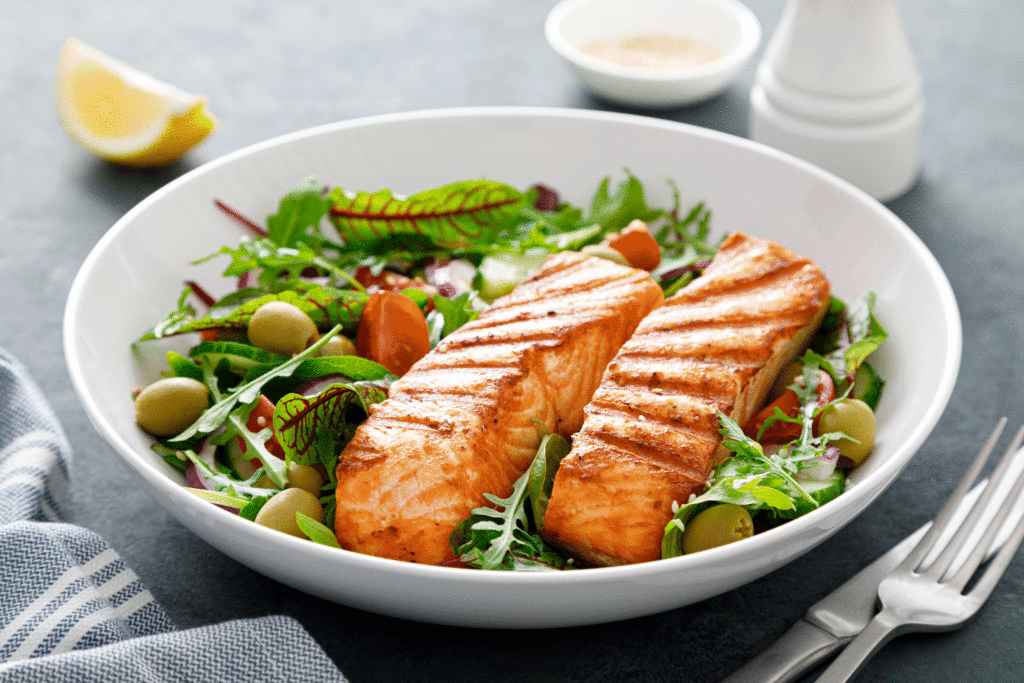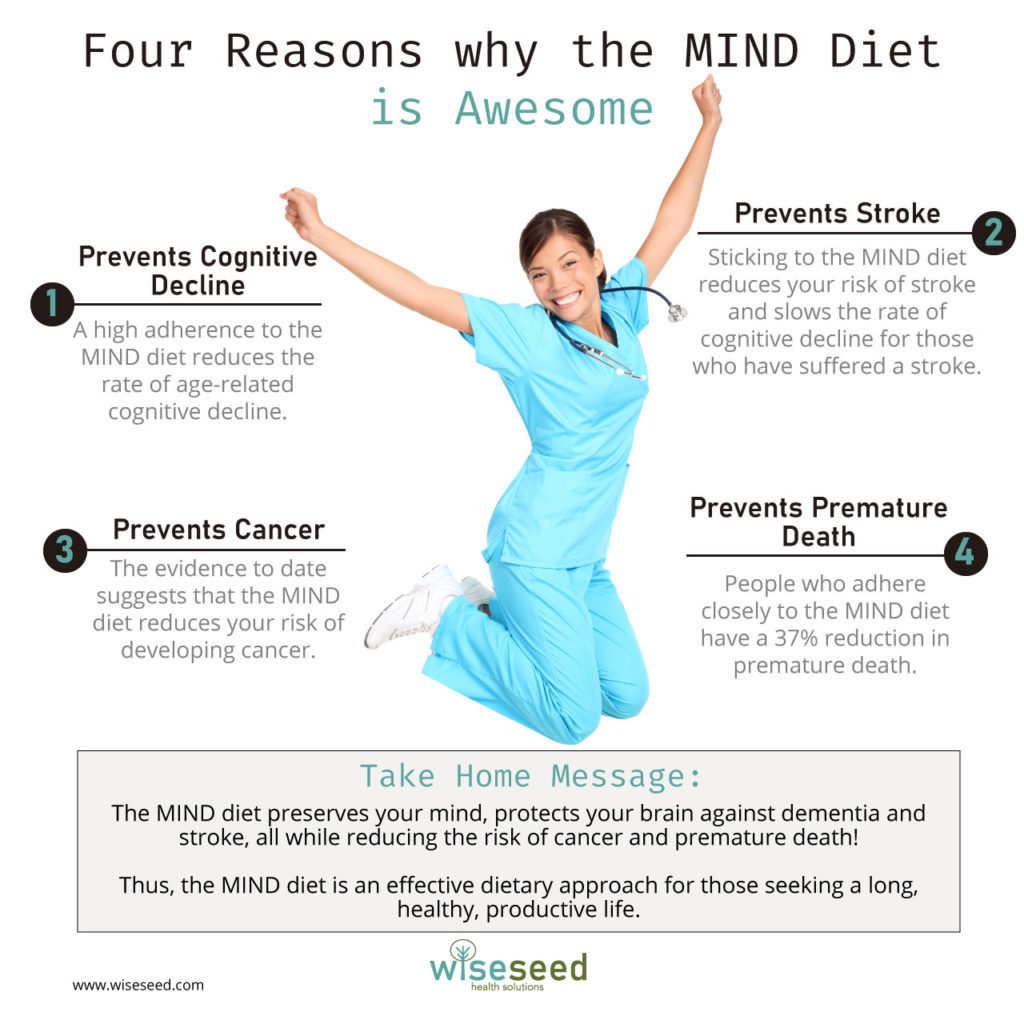Four Reasons Why the MIND Diet is Awesome

Why the MIND Diet?
I am certainly no dietary guru. However, as I slink into middle age, my poor nutritional choices are starting to catch up with me. As a result, I’ve been investigating a variety of diets with well-established anti-aging health benefits.
Of all the different diets I’ve researched, in my opinion, the MIND diet is the best.
What is the MIND Diet?
Dr. Morris and Colleagues designed the MIND Diet to protect your mind from the ravages of old age (1, 2).
The inspiration for the MIND diet was the Mediterranean and DASH diets, both of which protect you from cognitive decline (3, 4). However, Dr. Morris and Co. added essential ingredients to improve cognition, such as green leafy vegetables, berries, whole grains, and seafood (1) (see Table One).
| Brain Healthy Food Groups | Foods Groups to Minimize |
| Green Leafy Vegetables: 6 or more servings a week Other Vegetables: 1 or more servings a dayNuts: 5 servings a week Berries: 2 or more servings a week Beans: 3 or more servings a week Whole Grains: 3 servings a day Fish (not fried): one or more meals a week Poultry (not fried): two or more meals per week Olive Oil: the primary source of fat in the diet Wine: One glass per day | Butter and Stick Margarine Cheese Pastries and Sweets Fried or Fast Foods Red meat |
What are the health benefits of the MIND Diet?
1. The MIND Diet Preserves your Mind
The good news is that there is plenty of evidence supporting the MIND diet’s ability to protect your mind!
The earliest study demonstrated that high adherence to the MIND diet enjoyed a significantly reduced rate of age-related cognitive decline (1). Moreover, the MIND diet was more protective than either the Mediterranean or DASH diets (1). Furthermore, in Australia, sticking to the MIND diet reduced the risk of cognitive impairment by 46% (5)!
Not only does the MIND diet reduce so-called healthy cognitive decline in healthy adults, but it also protects you from dementia. Following the MIND diet significantly reduces the risk of Alzheimer’s disease (2) and Parkinson’s disease (6).
These and other studies show that adhering to the MIND diet is a wise investment if you are interested in preserving the power of your mind as you age.
2. The MIND Diet Prevents Stroke
Stroke is the leading cause of death and the second leading cause of disability globally (7). So obviously, having a stroke is best avoided. Fortunately, sticking to the MIND diet reduces your stroke risk by a whopping 59% (7)! Moreover, the MIND diet slows the rate of cognitive decline for those who have suffered a stroke (8).
Thus, high adherence to the MIND diet protects you from having a stroke and helps preserve cognitive function if you have suffered a stroke.
3. The MIND Diet Reduces the Risk of Cancer
It’s well known that healthy diets such as the Mediterranean and DASH diets reduce the risk of cancer (9).
Therefore, it’s not surprising that the MIND diet also reduces your cancer risk. For example, postmenopausal women who follow the MIND diet have a significantly lower risk of developing breast cancer than women following a standard diet (9). Furthermore, people highly adherent to the MIND diet have a roughly 47% reduced risk of experiencing the horror of brain cancer (10).
Thus, the evidence to date suggests that the MIND diet reduces your risk of developing cancer.
3. The MIND Diet Reduces The Risk of Premature Death
And finally, death.
Most people want to live long and healthy lives. Fortunately for us, an analysis by Dr. Janie Corley shows that people who adhere closely to the MIND diet have a 37% reduction in premature death! Further, the MIND diet outperformed the Mediterranean diet in reducing all-cause mortality (5)!
Thus, if you wish to enjoy a long life, then the MIND diet is for you.
Take-Home Message
The MIND diet preserves your mind, protects your brain against dementia and stroke, all while reducing the risk of cancer and premature death!
For these reasons, I believe that the MIND diet is an optimal dietary approach for those seeking a long, healthy, productive life.

References and Further Reading
1. M. C. Morris et al., MIND diet slows cognitive decline with aging. Alzheimers Dement 11, 1015-1022 (2015).
2. M. C. Morris et al., MIND diet associated with reduced incidence of Alzheimer’s disease. Alzheimers Dement 11, 1007-1014 (2015).
3. P. J. Smith et al., Effects of the dietary approaches to stop hypertension diet, exercise, and caloric restriction on neurocognition in overweight adults with high blood pressure. Hypertension 55, 1331-1338 (2010).
4. E. H. Martínez-Lapiscina et al., Mediterranean diet improves cognition: the PREDIMED-NAVARRA randomised trial. J Neurol Neurosurg Psychiatry 84, 1318-1325 (2013).
5. J. Corley, Adherence to the MIND diet is associated with 12-year all-cause mortality in older adults. Public Health Nutrition, 1-10 (2020).
6. P. Agarwal et al., MIND Diet Associated with Reduced Incidence and Delayed Progression of ParkinsonismA in Old Age. J Nutr Health Aging 22, 1211-1215 (2018).
7. A. Salari-Moghaddam et al., The association between adherence to the MIND diet and stroke: a case-control study. Nutr Neurosci, 1-6 (2021).
8. L. Cherian et al., Mediterranean-Dash Intervention for Neurodegenerative Delay (MIND) Diet Slows Cognitive Decline After Stroke. J Prev Alzheimers Dis 6, 267-273 (2019).
9. V. Aghamohammadi et al., Adherence to the MIND Diet and Risk of Breast Cancer: A Case-control Study. Clin Breast Cancer 21, e158-e164 (2021).
10. S. Soltani et al., Adherence to the MIND diet in relation to glioma: a case-control study. Nutr Neurosci, 1-8 (2020).
Disclaimer
The material displayed on this website is provided without any guarantees, conditions or warranties as to its accuracy.
Information written and expressed on this website is for education purposes and interest only. It is not intended to replace advice from your medical or healthcare professional.
You are encouraged to make your own health care choices based on your own research and in conjunction with your qualified practitioner.
The information provided on this website is not intended to provide a diagnosis, treatment or cure for any diseases. You should seek medical attention before undertaking any diet, exercise, other health program or other procedure described on this website.
To the fullest extent permitted by law we hereby expressly exclude all warranties and other terms which might otherwise be implied by statute, common law or the law of equity and must not be liable for any damages whatsoever, including but without limitation to any direct, indirect, special, consequential, punitive or incidental damages, or damages for loss of use, profits, data or other intangibles, damage to goodwill or reputation, injury or death, or the cost of procurement of substitute goods and services, arising out of or related to the use, inability to use, performance or failures of this website or any linked sites and any materials or information posted on those sites, irrespective of whether such damages were foreseeable or arise in contract, tort, equity, restitution, by statute, at common law or otherwise.

Ten Minutes is All You Need
Research has shown that ten minutes of moderate-to-vigorous exercise performed each day is enough to significantly reduce your risk of early death.

Submaximal Training for Older Adults
A simple strength program designed for older adults to to increase bone density and improve strength, power and muscle mass.




